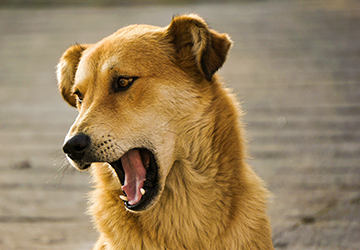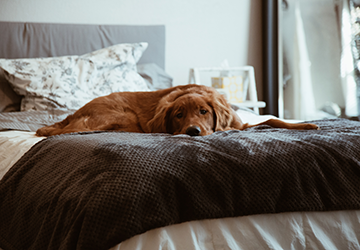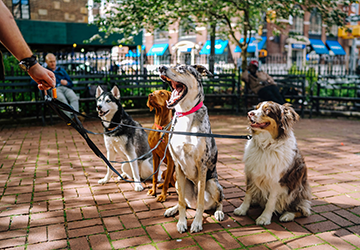Introduction:
Do you ever take your furry four-legged companion to doggy daycare or the groomers, assisted living centers, pet stores, and other communal places? If so, you may have heard of a concerning form of Upper Respiratory Infection called "Kennel Cough" or canine infectious tracheobronchitis. It is considered one of the most common illnesses among dogs, especially when they share space with other canines, such as in boarding facilities or pet daycare. The good news is that most cases of kennel cough can be treated at home with a few simple steps – but it's essential to understand the ins and outs before taking action. This article will discuss kennel cough, the causes of kennel cough in dogs, the symptoms and diagnosis, treatment options, and the precautions you can take to prevent it. So if you're wondering how dogs get kennel cough, read on to learn more!
What is Kennel Cough in Dogs?
Kennel cough, or canine infectious tracheobronchitis, is a highly contagious respiratory disease caused by various bacteria and viruses in dogs. It is characterized by trachea or windpipe inflammation, leading to a dry hacking-type cough lasting for weeks. Kennel cough can affect any dog of any age, breed, or size.
Kennel cough is transmitted through direct contact with infected dogs, contact with contaminated surfaces, or inhaling airborne agents. Dogs boarding kennels, attending dog shows, and visiting grooming facilities are most at risk for contracting the disease.
Kennel cough is highly contagious and can spread rapidly among unvaccinated dogs. Therefore, it is essential to take preventive measures such as vaccination, effective environmental disinfecting, and appropriate isolation of infected animals. Properly managing the disease is vital to preventing its spread.
Overall, kennel cough is a common and often mild condition that can be easily treated if caught early. However, monitoring your dog's health closely if they exhibit any signs of infection and contact your veterinarian for advice is essential.

What are the Causes of Kennel Cough in Dogs?
Kennel cough is a contagious respiratory illness that affects dogs, and various infectious agents cause it. Let's explore the causes of kennel cough in dogs.
1: Bacterial Infections –
One of the leading causes of kennel cough is a bacterial infection known as Bordetella bronchiseptica. This bacterium, which thrives in moist and dirty environments, is present in many shelters, boarding facilities, groomers, and other places where dogs congregate close. It is highly contagious and can spread quickly if the environment is not kept clean and sanitized.
2: Viral Infections –
In addition to bacterial infections, viral infections are a common cause of kennel cough in dogs. Canine adenovirus and canine parainfluenza are two of the most common viruses in dogs that can cause kennel cough. These infections can spread quickly in crowded environments, as they are highly contagious.
3: Stress –
In some cases, Stress can contribute to the development of kennel cough. Dogs anxious or scared due to unfamiliar environments, such as shelters and boarding facilities, may be more prone to developing kennel cough. Furthermore, Stress can suppress the immune system, making it easier for infectious agents to take hold.
4: Poor Air Quality –
Poor air quality can also be a factor in the development of kennel cough. If the air is dusty or full of irritants such as smoke, this can make it easier for infectious agents to spread and cause respiratory illnesses in dogs. Poor ventilation in confined spaces can also contribute to the transmission of kennel cough.
Symptoms of Kennel Cough in Dogs?
Kennel Cough is a contagious respiratory illness in dogs, and it can cause various symptoms. Some of the most common symptoms include:
1: Coughing and Sneezing –
The most common symptom of kennel cough in dogs is a dry, hacking cough that may be accompanied by sneezing. The coughing may sound like a honking or gagging noise and can worsen when the dog is excited or exerts itself. The cough may become more persistent in severe cases, and the dog may experience difficulty breathing.
2: Nasal Discharge –
Another symptom of kennel cough is a runny nose or nasal discharge. This can be clear and watery or thick and colored. In some cases, it may even contain blood. If a dog is experiencing nasal discharge, it's essential to take them to the vet as soon as possible for treatment.
3: Reduced Appetite –
Dogs with kennel cough may also have reduced appetite and may not be interested in their food. This can lead to weight loss if the condition is not treated quickly. Ensuring your dog eats enough and gets proper nutrition during recovery is essential.
4: Lethargy –
Finally, dogs with kennel cough may be more lethargic than usual and may not have the same energy levels. They may also sleep more and want to avoid engaging in activities they usually enjoy. If you notice these symptoms, taking your dog to a vet for diagnosis and treatment is essential.
What are the Diagnosis and Treatment of Kennel Cough?
Dog owners should take their pups to the vet for diagnosis and treatment if they suspect kennel cough. The vet can diagnose the condition using a physical exam and may order additional tests such as chest X-rays, blood work, or a tracheal wash.
1: Diagnosis –
The vet will perform a physical exam and may also order additional tests such as chest X-rays, blood work, or a tracheal wash. The vet may swab the dog's nose and throat to check for bacteria or viruses. This can help determine which type of infection is causing the
2: Treatment –
Once the specific cause of kennel cough is determined, treatment can begin. If a bacterial infection is present, antibiotics may be prescribed. For viral infections, antiviral medications may be used. In some cases, supportive care such as rest and hydration can help the dog recover quickly.
3: Prevention –
The best way to prevent kennel cough is by ensuring your dog's vaccinations are current. Additionally, do your best to minimize exposure to other dogs and keep your pet in clean and well-ventilated environments. Finally, consult a vet if you notice any of the above-mentioned symptoms.
4: Home Care –
In addition to seeking veterinary treatment for kennel cough, there are some things you can do at home to help your dog recover. Ensure they get plenty of rest and that their environment is clean and free of dust or irritants. You should also ensure they can access fresh water and a balanced diet. Ask your vet about over-the-counter medications that can help with coughing if necessary.
What are the Precautions You Can Take to Prevent Kennel Cough?
Dog owners can take several steps to prevent kennel cough in their pets. Here are some recommendations:
1: Vaccination –
The most important thing you can do to help protect your dog from kennel cough is to ensure they are up-to-date on their vaccinations. Vaccines such as the Bordetella and the canine influenza virus vaccine are available and can help reduce the risk of your pet contracting kennel cough.
2: Cleanliness –
Maintaining a clean environment for your dog is essential, especially if they come into contact with other animals in places such as groomers or boarding facilities. Keeping the area clean and sanitized can help reduce the spread of kennel cough.
3: Avoid Stress –
If your dog is anxious or scared, you should avoid placing them in a situation where they are likely to develop kennel cough. Keep them in familiar environments, which can help reduce stress levels and make them less vulnerable to infection.
4: Good Air Quality –
Finally, it is essential to ensure the air quality in your home is good. If possible, avoid smoky or dusty areas, as these can increase the risk of kennel cough. In addition, good ventilation can help reduce the spread of infectious agents and keep your pet healthy.
Following these preventive measures can help protect your dog from kennel cough and other respiratory illnesses.

Relevant Question:
Q: How did my dog get kennel cough at home?
A: Unfortunately, kennel cough is highly contagious and can be spread from one dog to another in many ways. Your dog may have gotten the illness by contacting an infected dog or object, such as a food bowl. If you think your pet might have been exposed to something like this, you must take them to the vet for a checkup. They may be able to diagnose your pet and provide appropriate treatment. Maintaining good hygiene and cleanliness in your home is also essential, as this can help limit the spread of kennel cough. You can help keep your four-legged friend healthy and safe by taking preventative measures now!
Q: Can a dog randomly get kennel cough?
A: Yes, a dog can randomly get kennel cough. It is common for healthy dogs to suddenly develop a dry, rasping cough if exposed to the bacteria or virus that causes this condition. Treatment of kennel cough typically involves antibiotics and keeping your pup away from other dogs until fully recovered. Be sure to consult with your veterinarian to identify the cause of your pup's cough and determine the best treatment.
Q: How do I stop my dog's kennel cough?
A: Treatment for kennel cough usually includes antibiotics and other medications to reduce symptoms and speed up recovery. Your veterinarian can guide the best treatment option for your dog. Keeping your pet away from other dogs until it fully recovers is also essential, as kennel cough is highly contagious. Good hygiene practices, such as regularly cleaning the kennel, toys, and other items that come in contact with your pet, are also essential for preventing the spread of the virus. It would also help to vaccinate your dog to protect against kennel cough regularly. The vaccination must be repeated annually or bi-annually, depending on the type of vaccine used.
Conclusion Paragraph
Kennel cough is an infectious upper respiratory disease that can affect your pup. Recognizing the symptoms, taking preventative measures such as vaccinations, and following appropriate hygiene protocols are essential. However, even if a dog has been appropriately vaccinated and handled all the necessary precautions, it may still develop kennel cough. Therefore, it is essential to familiarise yourself with what can cause this condition, its possible signs and symptoms, and the correct diagnosis and treatment approach according to your furry friend's individual needs. Knowing how dogs get kennel cough enables you to watch out for any potential warning signs to keep your pup in tip-top shape all year round.





